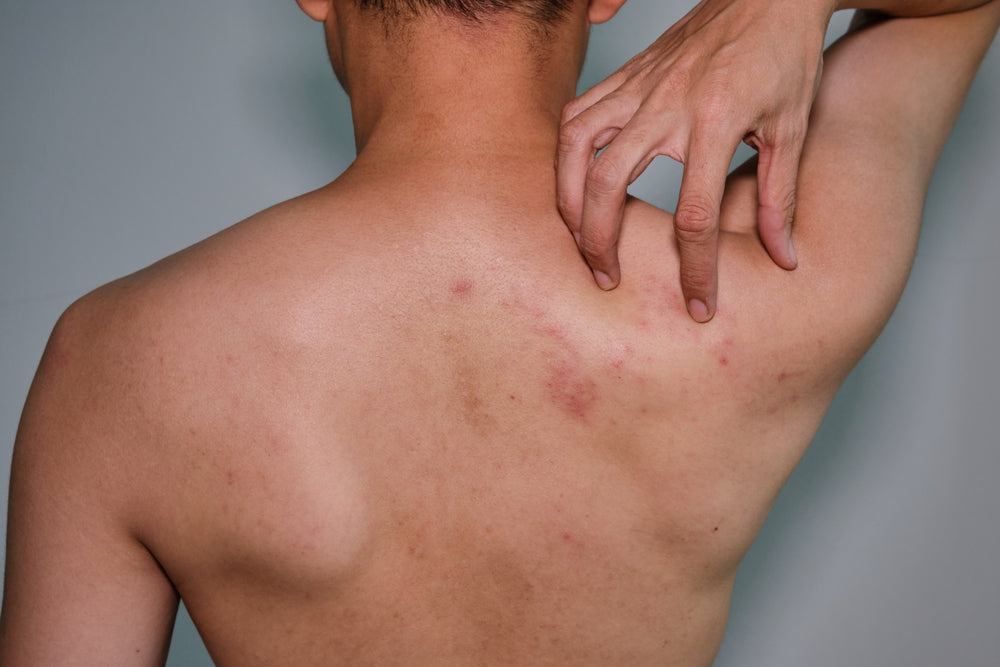Free U.S. Shipping On Orders Over $150

Everything You Need to Know About Acne Mechanica (Friction Acne): Causes, Symptoms and Prevention
Posted on
Acne mechanic or friction acne is a type of acne that’s caused by constant or frequent friction and pressure on a particular area of the skin.
Friction acne typically occurs as a result of clothing rubbing against the skin like the collar of a shirt or too-tight pants. It can also be caused by sports gear, jewelry, a helmet and other items in contact with the skin.
While acne mechanica is usually not serious and goes away once there’s no more friction, the pimples can get infected and turn painful if it keeps recurring. Here’s everything you need to know about friction acne, what causes it and how you can avoid it.
What Causes Acne Mechanica?
There are many causes of acne. That’s why there are many different kinds of acne. The most common type of acne, acne vulgaris, occurs when hair follicles are clogged with sebum, dead skin cells, dirt and other debris, resulting in zits or pimples.
You can also get cystic acne, if the pimples become infected. There’s also hormonal acne caused by hormonal imbalance and fungal acne that occurs when hair follicles get clogged by yeast.
Acne Mechanica, as the term suggests, occurs as a result of mechanical action. In this case, it’s a combination of pressure and friction on the skin. Heat and sweat increase the risk of an acne breakout.
People already vulnerable to regular acne are more likely to get friction pimples. But anyone can get friction acne. It is especially common in students, soldiers and athletes.
In students and soldiers, it is caused by carrying heavy bags or gear constantly. Shoulder straps can cause pimples to appear on the shoulders. Lagging around a heavy backpack can also cause friction acne on your back.
For athletes, the most common cause is sports gear like pads, straps and helmets that constantly rub and press against the skin. Throw in sweat, heat and dirt, and it’s easy for acne to appear.
Other causes of acne mechanica include too-snug clothes, bra straps, clothes with a rough texture, masks and sitting for long periods.
How to Tell Whether Its Friction Acne
It’s possible to confuse friction acne with regular acne or even a heat rash. Here are a few signs that you have acne mechanica.
- The pimples start out as rough bumps that then turn into inflamed pimples.
- The pimples don't have any black or whiteheads. These appear only with acne vulgaris. Friction acne causes regular looking pimples.
- The pimples occur only on a particular area of the skin where there is constant friction and pressure like under a strap, beneath the tight waist of your pants or on your butt.
- Pimples disappear when you change into loose clothes, get home from the gym or stop carrying heavy gear.
How to Treat Friction Acne
Treatments for regular acne also work for treating acne mechanica. These include benzoyl peroxide, salicylic acid and adapalene. These are enough to control and treat acne mechanica.
Usually, though, making changes to reduce friction and pressure is enough to get rid of friction acne. But if it’s not possible to do that (e.g. you have to wear sports gear or strap on a guitar), then using acne medication can help control acne breakouts.
If your acne doesn’t disappear after several weeks or seems to be getting worse, we recommend seeing your doctor or a dermatologist. You may need stronger prescription medication. There might also be an underlying condition that’s making the friction acne worse such as hormonal imbalance.
How to Prevent Acne Mechanica
Here are some tips to prevent friction acne.
- Wear loose or well fitting clothing that doesn't rub or press against your skin. This includes underwear, sportswear and even socks.
- Wear clothes that are soft and gentle on your skin. They cause less friction, which reduces the risk of a breakout. We especially love clothes made with natural fabrics like cotton, bamboo and silk.
- Wear clothes that are breathable and moisture-wicking. They cause less heat and sweat to get trapped against your skin, which prevents friction acne. Our range of Hercleon antimicrobial clothing is not only soft and breathable, it also kills acne-causing bacteria.
- If you have to carry a heavy backpack, get one with padded straps to reduce pressure. Take frequent breaks from carrying the backpack and remove it as soon as possible.
- The same goes for sports gear. Don't wear it for longer than you need to and take frequent breaks. It’s also a good idea to buy high quality gear; it’s often designed to be gentler on your skin.
- Cleans your skin often with gentle soap to reduce dirt, sweat and oil build up.
Quick links
Contact
6063 Hudson Road #160
Woodbury, MN 55125
Yo@hercLeon.com
Leave a comment: